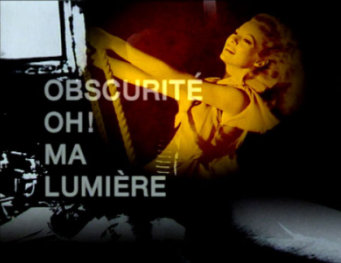
Gap-filling on Sight and Sound's new Hot 100, I'm checking out Godard's Histoire(s) (1988-1998), which some have praised, see, e.g., here and here (for a vital aid). In his New Biographical Dictionary of Film Thomson lauds as follows:
Of course, it was natural that Godard would provide his own retrospective—and sweep up the entire medium. Histoire(s) du Cinéma is a great catalogue work, worthy of Robert Musil or Walter Benjamin—or Chris Marker. But in its astonishing beauties, and the suggestiveness of its editing, one may still see and feel the Godard of the early sixties. Thus, the Histoire(s) reasserted, beyond doubt, that his is one of the great critical yet poetic minds in the medium.Unfortunately, so far (just one headache-causing hour in) I feel like Thomson's more caustic remarks about Godard's 1950s criticism apply equally well to Histoire(s):
"[T]ruly useful insights were offered in writing that was appalling, trite, chaotic, and gratuitously unreadable. It came armed with frightful name-dropping from literature and painting. Hardly a film could be classified without reference to Faulkner, Proust, Auguste Renoir, or Velázquez. In part, this was his need for classification, the unappeasable urge to cross-refer rather than to describe a thing itself. And these references are meaningless....Godard’s criticism is so aggressive that one feels only its insecurity... It means that his articles are addressed to himself, rather than to readers. The tone is austere and forbidding, as if to exclude others from cinema in the very act of celebrating it."Godard actually says relatively little in his own voice, and there it's mostly sententious nostrums to which one mostly wants to shrug or perhaps laugh (much as you would to a standard, empty political speech). But occasionally he makes a factual claim, some of which are plainly wrong, e.g., at 19 mins into the first part of the doc., Godard claims that Howard Hughes was a producer (producteur) of Citizen Kane, which is false. (Compare: a fluffy, largely content-free political speech that nonetheless makes a few it's easily-checked claims about unemployment rates or Benghazi or whatever.... that turn out to be flatly false.) The impact is devastating... it becomes very hard to stick-with Godard, to take him seriously. Overt contradictions such as between 'Cinema is not part of the communications industry or entertainment. It is part of cosmetics, the industry of masks.' (2nd part, 7 mins in) and 'It [cinema] boils down to entertainment. It can't be explained otherwise.' (2 minutes later) don't help either.
Since Godard doesn't care enough to get basic stuff right it's hard to have faith in or even ascribe determinate content to his more oracular, necessarily uncheckable remarks. Whether Histoires(s) can be satisfactory conceived as its own self-contained mega-video-art-piece/work of political science fiction remains to be seen, but on current evidence (update: 2 hours in) it can't be. Rather it appears to just be a mess, stuck in some messy zone between The Power of Nightmares, Sans Soleil, Cremaster Cycle, and Inland Empire, and decidedly inferior to all of those boundary points.
So who got Godard's Histoire(s) onto the Sight and Sound list (and ahead of, I dunno, Rear Window, M, NbNW, Touch of Evil, Night of the Hunter, and Sunset Boulevard)? Jonathan Rosenbaum, Richard Corliss, and who else?
Update: Finished it! Good God, well that's 4+ hours I'm never etc.. One of the (in my view, relatively few) highlights is his tribute to Hitchcock in the penultimate Chapter 4a (Le Contrôle de l’univers (1998) - The Control of the Universe). Godard's characteristically hyperbolic remarks (whch work much better accompanied by counterpointing, often slow-mo Hitchcock clips) are as follows:
We forget why Joan Fontaine leans over the cliff.
Why was Joel McCrea in Holland?
What confession did Montgomery Clift keep secret?
Why did Janet Leigh stop at the Motel?
Why does Theresa Wright still love Uncle Charlie?
What isn't Henry Fonda entirely guilty of?
Why did the American government hire Ingrid Bergman?But we remember a handbag.
But we remember a bus in the desert.
But we remember a glass of milk, a windmill, a hairbrush.
But we remember a row of bottles, a pair of glasses, a musical score, a key chain.Because with them and through them Alfred Hitchcock succeeded
where Alexander, Caesar, Hitler and Napoleon failed:
In taking control of the universe.Maybe 10,000 people haven't forgot Cèzanne's apple
but a billion remember the lighter in Strangers on a Train.Hitchcock, the only accursed poet to meet with success.
Our century's greatest creator of forms.
Forms tell us what is at the bottom of things.What is art, if not the way forms become style?
What is style... What is style, if not man?So it is a bra-less blonde tailed by a detective scared of heights
who proves that it's all cinema, that is, child's play.
No comments:
Post a Comment